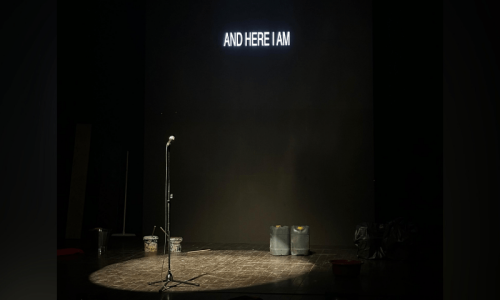Ahmed Tobasi portrays the realities of living under occupation and how it affected him and those around him in his play And Here I Am.
On October 25, the Freedom Theatre’s Palestinian art director performed his play entirely in Arabic as part of the Arts Council’s World Culture Festival in Karachi. He was born and raised in the West Bank refugee camp of Jenin, so the play is a reflection of his own life.
Tobasi redefined the term “resistance” beyond the standard definition in his dialogue with Images and in the play.
The play, which was first written in 2017, followed Tobasi’s life and showed different aspects of growing up under Israeli occupation, starting with his father’s arrest when Tobasi was about five years old during the first Intifada.
Having only trained for a day, Tobasi and his childhood friends joined the resistance during the second Intifada when they were just teenagers.
During practice one day prior to the second Intifada, Ahmed Tobasi posed as if he were holding a weapon. Image courtesy: ACP/Instagram After being captured, he was taken to the Negev desert prison of Ktzi’ot, where he spent four years.
Tobasi believes that he must fight for his values as an artist and takes pride in his struggles. He stated, “I’m happy that I come from that place that made me who I am today. When I look at other artists, other people, and other businesses…”
I’m not making art for the sake of having fun. I have nothing to do, so I’m not making art. The playwright clarified, “I’m not doing any research or taking the time to find the subject to talk about.” My life is loaded with vital things that I want to discuss.”
The play followed Tobasi’s life and looked at ways to resist an occupation without weapons.
The Opportunity Theater Partner Chief Zoe Lafferty said the play was “tied in with investigating the various techniques” of obstruction. ” She stated to Images following the performance, “It’s more cultural resistance than armed resistance.”
Tobasi portraying Mer Khamis, who teaches him resistance through culture. — Credit: Navaal Aamir, on the other hand, the play does not involve dropping the gun and beginning a separate movement. She explained that armed resistance was also a component of it, calling non-gun resistance a “romantic idea of the West.”
She said that Tobasi’s mentor, award-winning Arab-Israeli actor and director Juliano Mer-Khamis, always said that the third Intifada would be a “cultural intifada,” which is what the group was looking into in the play.
When the term “resistance” is mentioned, it is generally assumed that it refers to violence and weapons. Mer-Khamis, Tobasi’s teacher, however, instructed him to view resistance through the cultural lens.
Mer-Khamis said to a 21-year-old Tobasi, “Theatre can be as violent as a gun […] stage can be your AK-47,” when Tobasi joined the Freedom Theatre upon his release from prison.
At that point, Tobasi decided not to join the resistance. However, Fadi, the leader of his previous group, began threatening him with blackmail, claiming that he was working with the Israelis. By joining the resistance, he could only demonstrate that he was not an Israeli spy. They also gave Tobasi a lot of money, which he desperately needed because he had no opportunities to earn money.
Tobasi, on the other hand, decided to join Mer-Khamis.
In Jenin’s refugee camp in the northern West Bank, Mer-Khamis, the son of a Jewish mother and a Christian Arab father, established and ran the Freedom Theatre. He showed Tobasi how to resist through culture.
Tobasi said that he was certain that his mentor was “smiling now in his grave that I continue the message in the same way he wanted” when he spoke after the play, which ended with Mer-Khamis’ death.



